- The main difference between monday.com and Wrike is monday’s beautiful, sleek design.
- If you need features for productivity like a whiteboard or a document creator, monday.com is the better choice.
- Wrike is better than monday.com for people looking for a generous free project management tool.
Facts & Expert Analysis About Wrike and monday.com:
- Ease of use: In our experience, monday.com is significantly easier to learn and master than Wrike, which is an opinion shared by users across review websites like g2 and GetApp.
- User reviews: monday.com received the second highest number of user reviews of any software on review aggregator G2 according to its 2024 winter report, with 797 new reviews that quarter.1 Wrike received slightly fewer reviews in the same period, but still made it into 5th place with 671 users chiming in.
- Humble beginnings: Wrike, founded in 2005, has been around longer than monday.com, which started as an internal tool for project management and communication at Wix.com2, which we think is a key factor in its focus on usability.
Our Wrike vs monday comparison has one objective: to help you decide which is the best project management software for you. In short, Wrike is worth considering if you want access to a large number of integrations, while monday.com is worth checking out if you need an all-in-one platform. However, we go deeper than that — this article will leave no stone unturned.
With every iteration of our monday.com review, the platform seems to get better and better. On the other hand, our Wrike review constantly praises the platform’s ease of use and wide breadth of features. Still, there can only be one winner. It’s time to get into the juicy parts to find out which platform comes out on top.
Show allLearn more about our editorial team and our research process.
-
03/28/2024 Facts checked
Our Wrike vs monday comparison has been updated with new information and an easier-to-read format.
- updates
- 1$9.80 / month(All Plans)
- 2
Our Comparison Guidelines
We have spent countless hours testing both Wrike and monday.com. With that, we have gathered a deep understanding of how well they function for task management, team collaboration and all the project management tools they feature. We’re always on top of their pricing and how much value they offer.
We will pack those key points into this comparison. We’ll also consider how well each software functions, how easy it is to use and the level of support each provider offers its customers.
Cloudwards Editor’s Choice: monday.commonday.com is the better project management platform when compared to Wrike. It runs smoothly, is highly customizable and is perfect for teams of all sizes. Its mid-tier plans offer great value. However, what’s right for us may not be right for you. Keep reading to see what monday.com and Wrike have to offer.
monday.com vs Wrike: Comparison at a Glance
| Review | Review | |
| Kanban board | ||
| List | ||
| Calendar | ||
| Timeline | ||
| Spreadsheet view | ||
| Gantt charts | ||
| Workload planning | ||
| Long-term planning | ||
| Multiple project management | ||
| Dependency management | ||
| Native scrum management | ||
| Set user permissions | ||
| File storage | ||
| Time-tracking | ||
| Built-in integrations | ||
| Reporting features | ||
| Free plan | ||
| Free Trial | 14 days | 14 days |
| Web app | ||
| Windows | ||
| MacOS | ||
| Android | ||
| iOS | ||
| Ticket-based support | ||
| Tutorials | ||
| Knowledgebase | ||
| Forum | ||
| Live chat | ||
| Phone support |
Which Is Better: Wrike vs monday.com?
With regards to project management features, not much separates the two. However, we draw a fine line in this comparison. The overall user experience comprises a large part of deciding which is best. Take the design of each as an example. Wrike and monday.com have many of the same functionalities, but Wrike has a drab user interface that is far from inspiring.
On the other hand, monday.com has a beautiful, sleek design that inspires productivity from the moment you open it. It’s not perfect (the free plan could be better) but it works exceptionally well. Thanks to how versatile it is, including the array of project templates it offers, monday.com is the best option for a wide range of industries.
Who Is Wrike For?
- Free users: Wrike offers plenty of functionality on its free version and allows you to add unlimited users.
- Diverse users: Companies using a range of apps will certainly benefit from the more than 400 integrations that Wrike offers.
- Agile users: On top of agile templates, Wrike also has a wealth of resources to help you take an agile approach to project management.
Who Is monday.com For?
- Creative teams: Thanks to its beautiful whiteboard and integrated document creator, monday.com is great for creative projects.
- Sales teams: Users can build sales pipelines and detailed CRMs with a range of templates.
- All levels of experience: Because it’s so easy to use, the platform is ideal for inexperienced users.
Wrike Pricing vs monday.com Pricing: Which Has Better Plans?
A big plus for monday.com is that there seems to be a plan for all types of users. The pricing structure reflects this, and there’s a gentle increase in cost from the Basic plan to the Pro plan. Wrike’s Business plan costs more than double the amount of the plan below it, and neither is cheap. This squeezes out a lot of potential users.
Do Wrike and monday.com Have a Free Version?
Though we have already touched on each platform’s free version, below is a table that covers the core limitations of the free versions compared to the paid plans for each service.
Wrike vs monday.com: Similarities
Let’s start this comparison by looking at what these services have in common. We’ll cover tools for project management, team collaboration, time tracking and resource management.
Task Management ToolsManaging your daily tasks is the bread and butter of project management. Both Wrike and monday.com have multiple views for you to visualize your workload, and they’re very similar. A kanban board, Gantt chart, calendar, list view and timeline are all available. A spreadsheet view is available too, though monday.com offers it as a template.
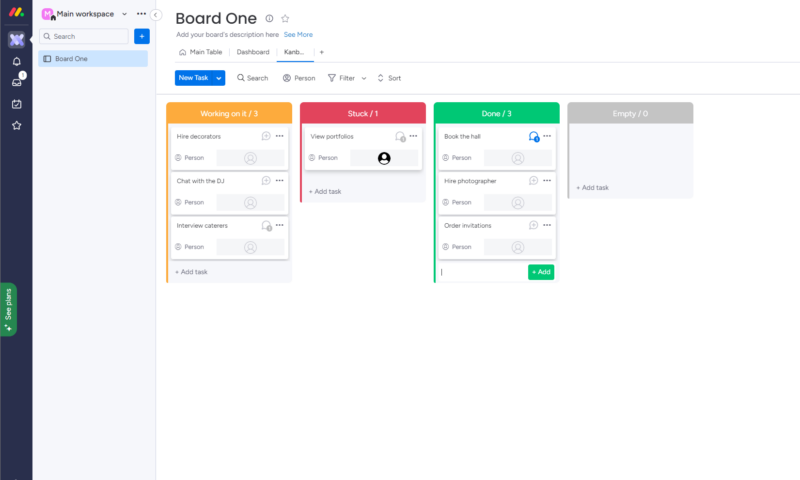
We found it smoother to jump between different views while using monday.com compared to Wrike. monday.com’s beautifully designed views also make a difference, especially when looking at project data for long periods of time.
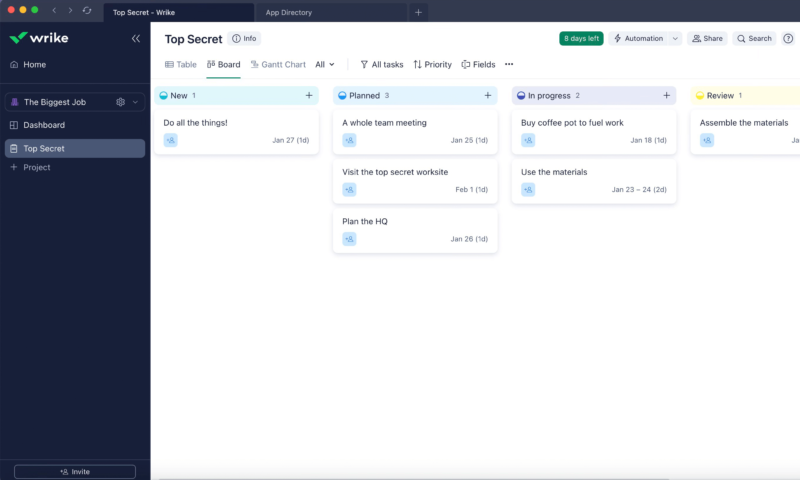
Little separates the two in terms of the data you can add to your tasks. Functionalities like adding due dates and assigning tasks are commonplace. You can also add task dependencies on both platforms. While Wrike lets you use these features with all of its paid plans, monday.com weirdly only allows it with its higher-tier paid plans.
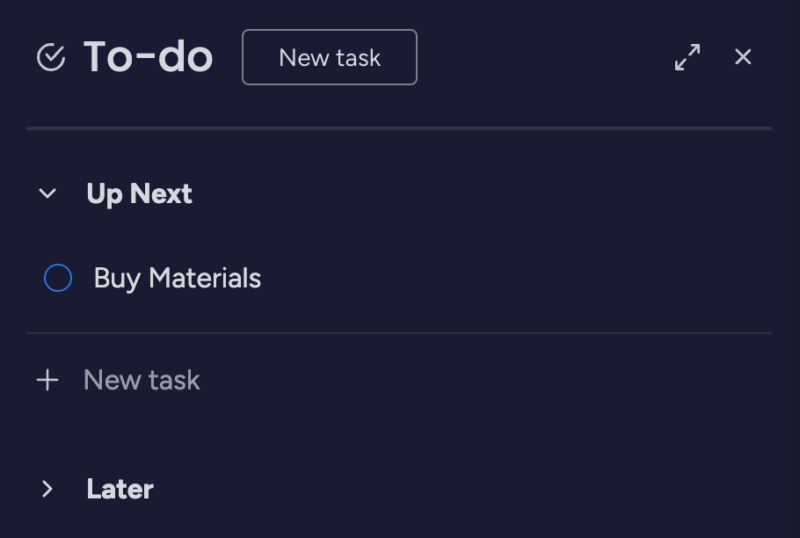
You can open task cards inside the kanban boards, Gantt charts and more, and leave comments for other users. However, if you’re just in the market for simple project management software that lets you add tons of task data, we recommend checking out our Trello review.
Building custom workflows should be a key part of your work management, and both Wrike and monday.com support this. Thanks to automation builders, you can automate tasks such as sending notifications to other users, assigning tasks and creating new tasks when one is complete.
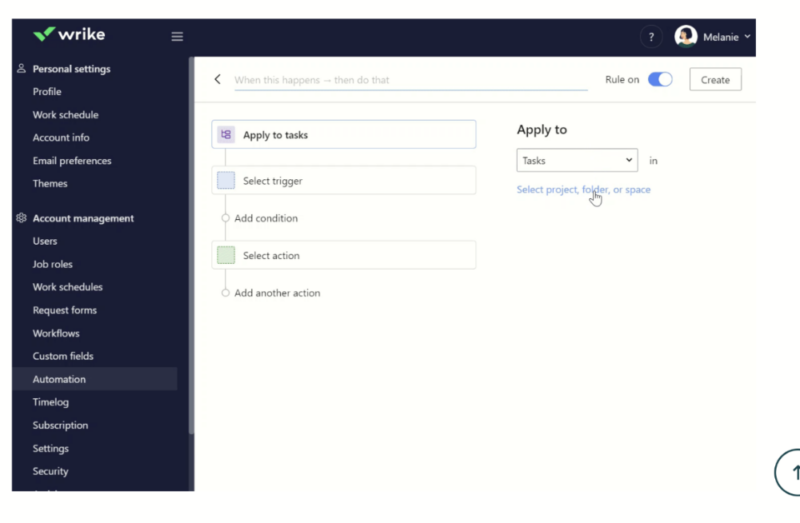
use of custom workflow automations.
Neither software requires you to be a coding guru, and you can set custom workflows with relative ease. It may take a bit of time to set up automations, but once they’re in place you will save lots of time in the long run.
Each platform has an integrated time tracker. You can find the trackers inside project boards, and their functionality is straightforward. Simply start the timer when you begin a task and stop it when your work is complete. With the native tools and templates, you can use each platform to create time sheets so you have an accurate record of all your work and can invoice accordingly.
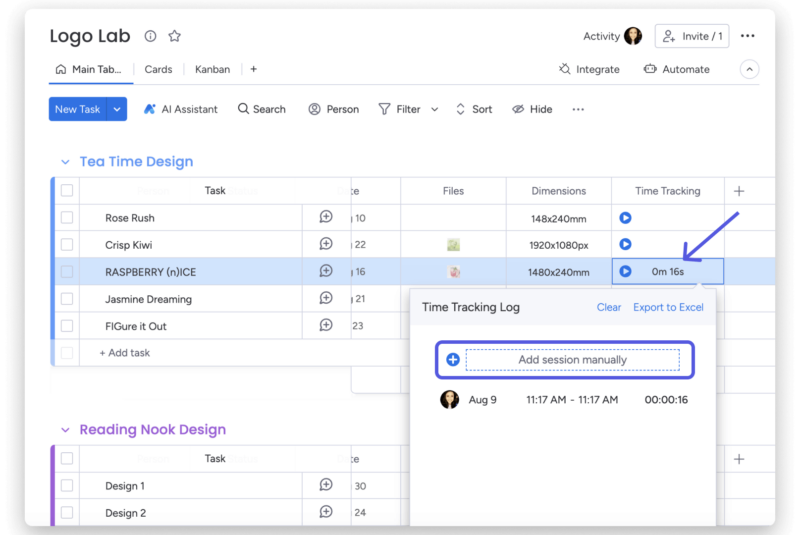
For those dealing with business-related information and making use of file storage, both services provide top-notch security for data. The unbreakable AES-256 encrypts your data, and both companies are SOC 2 Type II certified. This means that an independent governing body has deemed their practices satisfactory.
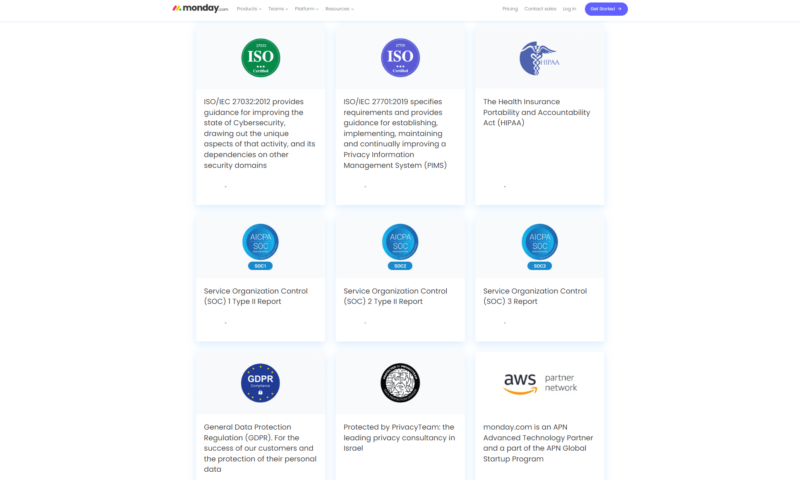
They both offer two-factor authentication as well. However, monday.com allows it on all plans, whereas Wrike reserves it for its top two paid plans. SSO is also available, but both reserve it for their higher-tier paid options. Both are also HIPAA compliant, which makes them great project management software options for healthcare organizations.
monday.com vs Wrike: Differences
Let’s now take a look at some of the key differences between the two platforms. This is where you’ll get the best idea of which platform is right for you.
User Interface DesignWrike’s interface looks like the face of a scorned child: miserable. Alternatively, monday.com has all the vibrancy of a Caribbean paradise. Perhaps that’s a stretch, but the reality is that Wrike seems to have put little effort into its design, which we think makes productivity more difficult.
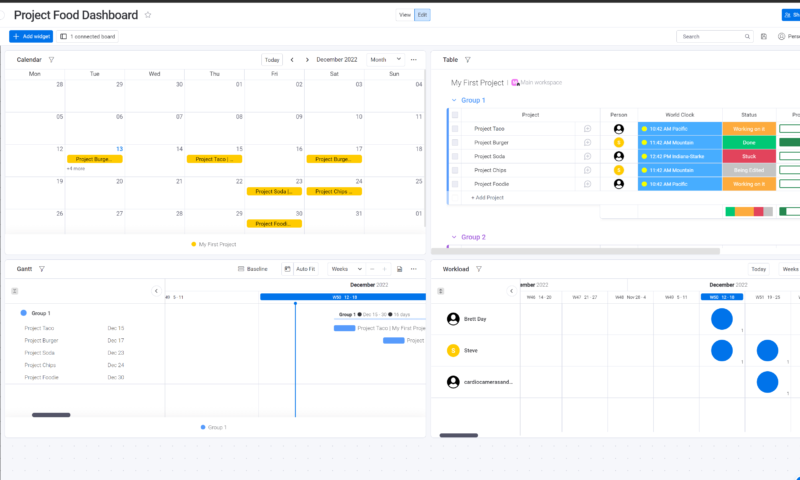
thanks to monday.com’s beautiful dashboard.
monday.com’s clean and customizable user interface, mixed with beautiful fonts, gears us up to do our work. The importance of a good design may not be apparent with a single use, but when you’re using a product daily, it certainly makes a difference in how much you enjoy using it.
Despite the clear difference in design, both platforms are on par when it comes to navigation. During our testing, we noted that both services have done a great job of laying out their features. Everything we needed was easy to find, and the tools and sub-menus were where we expected them to be.
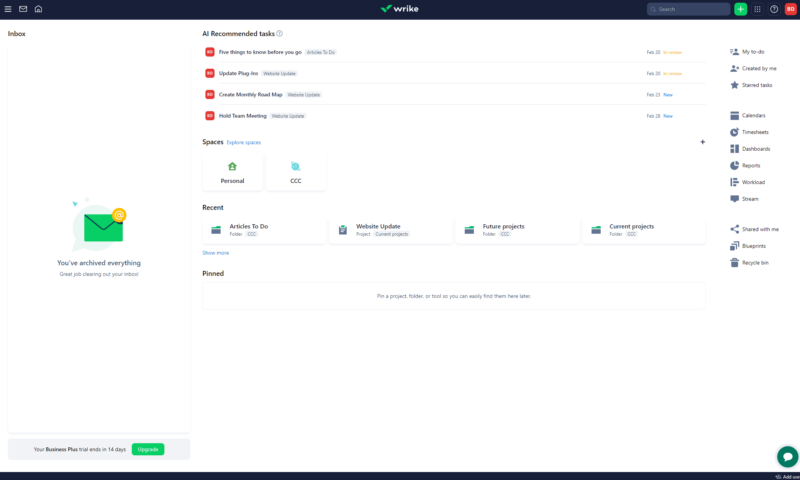
monday.com is the leader for anyone working on creative projects. It offers a native whiteboard that you can use to embed images, stickies and other visual elements. Marketing teams will love this, as it’s a perfect space to create and discuss materials with other users. It’s one of the reasons monday.com is the best project management software for marketing.
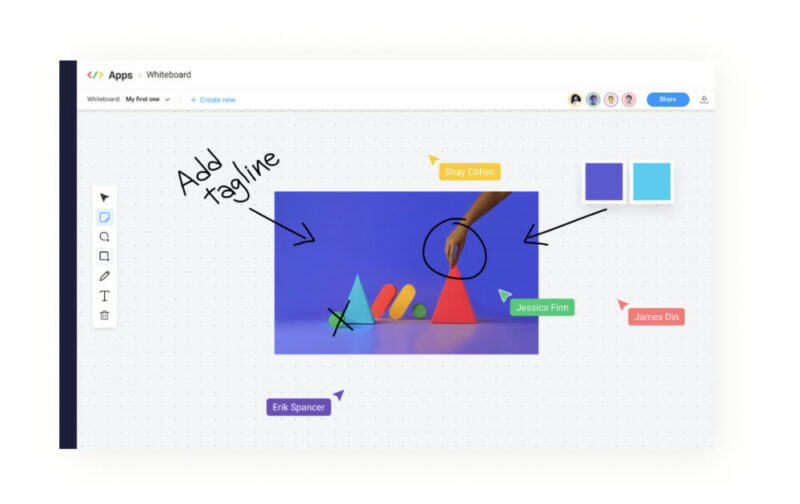
The platform also offers an integrated document creator so you can write about anything you see fit. You can collaborate with other users in real time and set specific user permissions. Wrike isn’t quite up to speed when it comes to tools for creative projects. However, it does have an online proofing tool that lets users discuss content such as photos and PDFs in real time.
Both platforms allow you to integrate with third-party apps. monday.com offers more than 100 integrations, including Google Apps, Slack and DocuSign. On the other hand, Wrike offers more than 400 integrations, including less well-known apps such as Miro and Tableau.
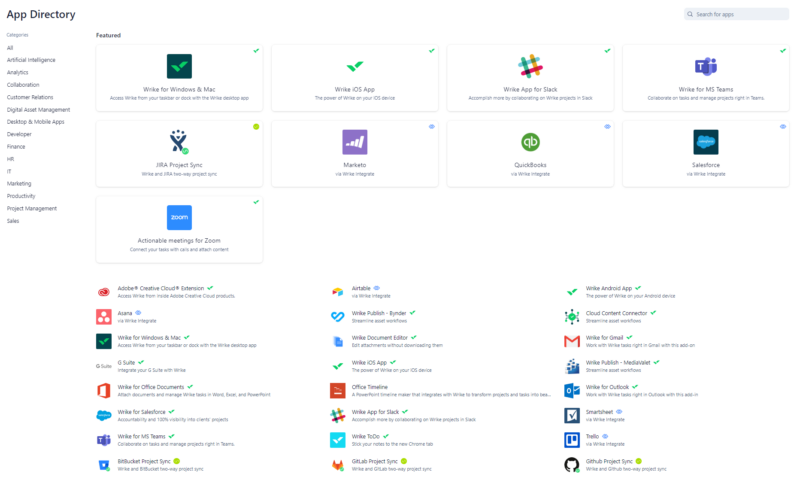
apps thanks to Wrike’s integrations.
Few companies have the perfect privacy policy, but some are better than others. Though monday.com takes a good chunk of user data, such as name, email address and IP address, the good news is it doesn’t share that info with third parties for advertising. It will, however, send you ads related to the product and use your data to “improve the software.”
On the other hand, Wrike does state that it may share your account, business, device and social media data with third parties for advertising purposes, which we’re not fans of. However, Wrike is HIPAA, GDPR and CCPA compliant (as is monday.com). Depending on where you are in the world, you have the right to opt out of companies selling your data to third parties.
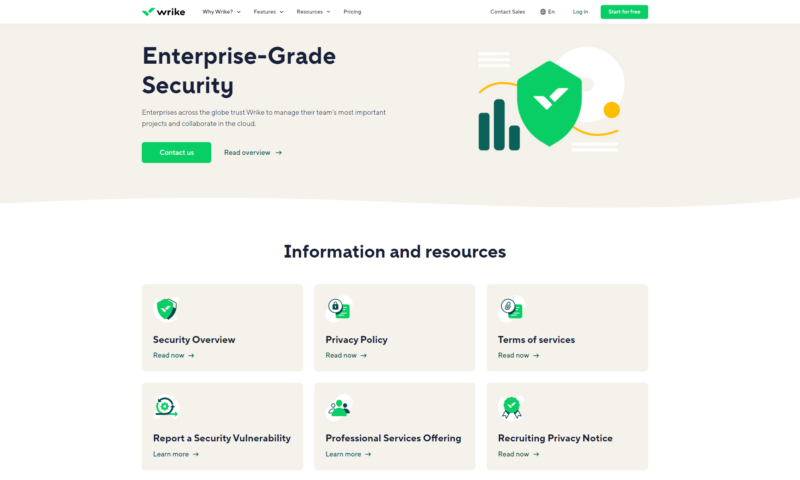
Both services offer a free plan, but Wrike offers a more comprehensive package. You can add unlimited users to Wrike’s free plan, whereas on monday.com you can add only two. You also get more file storage space on Wrike, which offers 2GB compared to monday.com’s 500MB. It’s not much though, so we’d still suggest using one of the best cloud storage services.
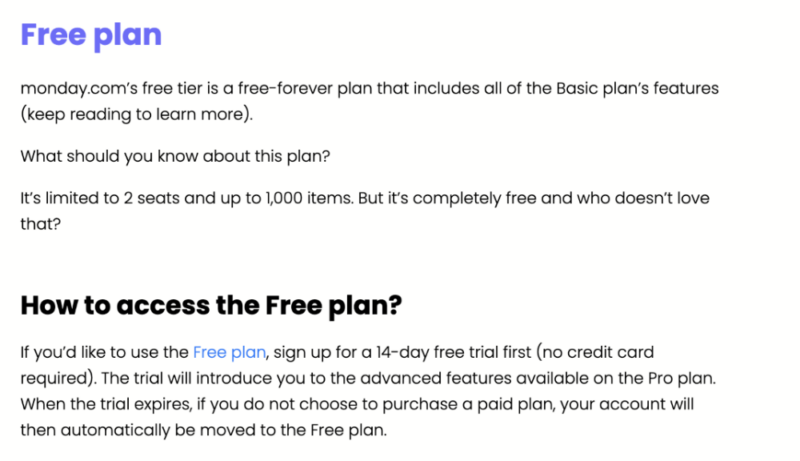
All in all, there’s more functionality and usability with Wrike’s free version, so keep that in mind if you don’t want a paid option. In fact, Wrike’s free plan is so good that it consistently makes our selection of the best free project management software.
If You Want to Consider Other Services, Check Out…
If neither Wrike nor monday.com are for you but you still want an all-in-one platform, check out our ClickUp review. The platform comes armed with a whiteboard for creative project planning and a document creator. It offers all the project management tools you could need to effectively manage projects.

We’d also recommend reading our Zoho Projects review. The platform’s paid plans are very affordable, and it’s packed with premium tools. It’s also highly expandable, and you can integrate with other Zoho products, including Zoho Sprints and Zoho CRM.
- 1
- 2
- 3
- 4$15 / month(All Plans)
- 5
The Verdict: Why We Think monday.com Wins Overall
The key difference between monday.com and Wrike is the former’s user-friendly interface. Mix in its creativity tools and it’s hard to think of a field monday.com isn’t suitable for. monday’s balanced pricing structure also means there’s a plan for everyone — something Wrike should consider in its pricing structure.
As we mentioned, ClickUp is a very similar product to monday.com. Check out our monday.com vs ClickUp comparison to get into the nitty gritty before committing to either one. Alternatively, if you’re still unsure about Wrike vs monday, both platforms offer a 14-day free trial. Check them out to decide for yourself.
Did you find this comparison useful? Which of the two services will you choose? Which other services would you like us to compare? Let us know in the comments, and thanks for reading.
FAQ: Comparing monday.com vs Wrike
- Is There Something Better Than monday.com?
For us, monday.com is the best project management software currently available. However, other good options include ClickUp and Zoho Projects.
- What Is Wrike Best Used For?
Wrike is best for project management and is suitable for industries of all types. Fans of agile software also speak very highly of Wrike.
- Why Is monday the Best Project Management Tool?
monday.com is the best project management tool thanks to its diverse feature set. It’s the ideal option for both basic and complex projects and for those working on multiple projects due to its excellent dashboard.
- Why Is Wrike Considered a Top Choice for Project Management Software?
Wrike is popular thanks to its range of features. It also has more than 400 third-party app integrations, making it a top choice for those who want to easily expand their workflows.
Sources:
- 2024 Winter Report – G2
- Standing On Its Own: Wix Spin-Off daPulse Scores 1.5m Series A For Its Internal Communications Tool – TechCrunch
The post Wrike vs monday.com Comparison: Project Management Software Features, Pricing & Value in 2024 appeared first on Cloudwards.
 9 months ago
55
9 months ago
55

